 Tìm kiếm
Tìm kiếm
Chương 2 Luật nuôi con nuôi 2010: Nuôi con nuôi trong nước
| Số hiệu: | 52/2010/QH12 | Loại văn bản: | Luật |
| Nơi ban hành: | Quốc hội | Người ký: | Nguyễn Phú Trọng |
| Ngày ban hành: | 17/06/2010 | Ngày hiệu lực: | 01/01/2011 |
| Ngày công báo: | 23/09/2010 | Số công báo: | Từ số 562 đến số 563 |
| Lĩnh vực: | Quyền dân sự | Tình trạng: | Còn hiệu lực |
TÓM TẮT VĂN BẢN
Văn bản tiếng việt
Văn bản tiếng anh
1. Người nhận con nuôi phải có đủ các điều kiện sau đây:
a) Có năng lực hành vi dân sự đầy đủ;
b) Hơn con nuôi từ 20 tuổi trở lên;
c) Có điều kiện về sức khỏe, kinh tế, chỗ ở bảo đảm việc chăm sóc, nuôi dưỡng, giáo dục con nuôi;
d) Có tư cách đạo đức tốt.
2. Những người sau đây không được nhận con nuôi:
a) Đang bị hạn chế một số quyền của cha, mẹ đối với con chưa thành niên;
b) Đang chấp hành quyết định xử lý hành chính tại cơ sở giáo dục, cơ sở chữa bệnh;
c) Đang chấp hành hình phạt tù;
d) Chưa được xóa án tích về một trong các tội cố ý xâm phạm tính mạng, sức khỏe, nhân phẩm, danh dự của người khác; ngược đãi hoặc hành hạ ông bà, cha mẹ, vợ chồng, con, cháu, người có công nuôi dưỡng mình; dụ dỗ, ép buộc hoặc chứa chấp người chưa thành niên vi phạm pháp luật; mua bán, đánh tráo, chiếm đoạt trẻ em.
3. Trường hợp cha dượng nhận con riêng của vợ, mẹ kế nhận con riêng của chồng làm con nuôi hoặc cô, cậu, dì, chú, bác ruột nhận cháu làm con nuôi thì không áp dụng quy định tại điểm b và điểm c khoản 1 điều này.
1. Trường hợp trẻ em không được nuôi dưỡng trong môi trường gia đình gốc thì cơ quan, tổ chức, cá nhân liên quan có trách nhiệm tìm gia đình thay thế cho trẻ em đó.
2. Việc tìm gia đình thay thế cho trẻ em được quy định như sau:
a) Trường hợp trẻ em bị bỏ rơi thì Ủy ban nhân dân cấp xã nơi phát hiện trẻ em bị bỏ rơi có trách nhiệm tìm người hoặc tổ chức tạm thời nuôi dưỡng trẻ em; nếu có người nhận trẻ em làm con nuôi thì Ủy ban nhân dân cấp xã nơi phát hiện trẻ em bị bỏ rơi xem xét, giải quyết theo quy định của pháp luật; nếu không có người nhận trẻ em làm con nuôi thì lập hồ sơ đưa trẻ em vào cơ sở nuôi dưỡng;
b) Trường hợp trẻ em mồ côi không có người nuôi dưỡng hoặc trẻ em có cha mẹ đẻ, người thân thích nhưng không có khả năng nuôi dưỡng thì người giám hộ, cha mẹ đẻ, người thân thích có trách nhiệm báo cáo Ủy ban nhân dân cấp xã nơi trẻ em thường trú tìm gia đình thay thế cho trẻ em. Ủy ban nhân dân cấp xã có trách nhiệm hỗ trợ nuôi dưỡng trẻ em và thông báo, niêm yết tại trụ sở Ủy ban nhân dân trong thời hạn 60 ngày để tìm người nhận trẻ em làm con nuôi; nếu có người trong nước nhận trẻ em làm con nuôi thì Ủy ban nhân dân cấp xã xem xét, giải quyết. Hết thời hạn thông báo, niêm yết, nếu không có người trong nước nhận trẻ em làm con nuôi thì Ủy ban nhân dân cấp xã lập hồ sơ đưa trẻ em vào cơ sở nuôi dưỡng;
c) Trường hợp trẻ em ở cơ sở nuôi dưỡng cần có gia đình thay thế, cơ sở nuôi dưỡng lập danh sách gửi Sở Tư pháp. Sở Tư pháp có trách nhiệm thông báo 03 lần liên tiếp trên báo viết hoặc phương tiện thông tin đại chúng khác của tỉnh.
Trong thời hạn 60 ngày, kể từ ngày thông báo, nếu có người trong nước nhận trẻ em làm con nuôi thì người đó liên hệ với Ủy ban nhân dân cấp xã nơi trẻ em thường trú để xem xét, giải quyết; nếu việc nhận con nuôi đã hoàn thành thì Ủy ban nhân dân cấp xã báo cáo Sở Tư pháp để xóa tên trẻ em đó trong danh sách trẻ em cần tìm gia đình thay thế.
Hết thời hạn 60 ngày, kể từ ngày thông báo, nếu không có người trong nước nhận trẻ em làm con nuôi thì Sở Tư pháp gửi danh sách trẻ em cần tìm gia đình thay thế cho Bộ Tư pháp;
d) Bộ Tư pháp có trách nhiệm thông báo tìm người trong nước nhận trẻ em làm con nuôi trên trang thông tin điện tử của Bộ Tư pháp.
Trong thời hạn 60 ngày, kể từ ngày thông báo, nếu có người trong nước nhận trẻ em làm con nuôi thì người đó liên hệ với Ủy ban nhân dân cấp xã nơi trẻ em thường trú để xem xét, giải quyết; nếu việc nhận con nuôi đã hoàn thành thì Ủy ban nhân dân cấp xã báo cáo Bộ Tư pháp để xóa tên trẻ em đó trong danh sách trẻ em cần tìm gia đình thay thế.
Hết thời hạn 60 ngày, kể từ ngày thông báo, nếu không có người trong nước nhận trẻ em làm con nuôi thì Bộ Tư pháp thông báo cho Sở Tư pháp.
Công dân Việt Nam có nguyện vọng và đủ điều kiện nhận con nuôi theo quy định của Luật này nhưng chưa tìm được trẻ em để nhận làm con nuôi thì đăng ký nhu cầu nhận con nuôi với Sở Tư pháp nơi người đó thường trú; nếu có trẻ em để giới thiệu làm con nuôi thì Sở Tư pháp giới thiệu đến Ủy ban nhân dân cấp xã nơi trẻ em đó thường trú để xem xét, giải quyết.
Hồ sơ của người nhận con nuôi gồm có:
1. Đơn xin nhận con nuôi;
2. Bản sao Hộ chiếu, Giấy chứng minh nhân dân hoặc giấy tờ có giá trị thay thế;
3. Phiếu lý lịch tư pháp;
4. Văn bản xác nhận tình trạng hôn nhân;
5. Giấy khám sức khỏe do cơ quan y tế cấp huyện trở lên cấp; văn bản xác nhận hoàn cảnh gia đình, tình trạng chỗ ở, điều kiện kinh tế do Ủy ban nhân dân cấp xã nơi người nhận con nuôi thường trú cấp, trừ trường hợp quy định tại khoản 3 Điều 14 của Luật này.
1. Hồ sơ của người được giới thiệu làm con nuôi trong nước gồm có:
a) Giấy khai sinh;
b) Giấy khám sức khỏe do cơ quan y tế cấp huyện trở lên cấp;
c) Hai ảnh toàn thân, nhìn thẳng chụp không quá 06 tháng;
d) Biên bản xác nhận do Ủy ban nhân dân hoặc Công an cấp xã nơi phát hiện trẻ bị bỏ rơi lập đối với trẻ em bị bỏ rơi; Giấy chứng tử của cha đẻ, mẹ đẻ hoặc quyết định của Tòa án tuyên bố cha đẻ, mẹ đẻ của trẻ em là đã chết đối với trẻ em mồ côi; quyết định của Tòa án tuyên bố cha đẻ, mẹ đẻ của người được giới thiệu làm con nuôi mất tích đối với người được giới thiệu làm con nuôi mà cha đẻ, mẹ đẻ mất tích; quyết định của Tòa án tuyên bố cha đẻ, mẹ đẻ của người được giới thiệu làm con nuôi mất năng lực hành vi dân sự đối với người được giới thiệu làm con nuôi mà cha đẻ, mẹ để mất năng lực hành vi dân sự;
đ) Quyết định tiếp nhận đối với trẻ em ở cơ sở nuôi dưỡng.
2. Cha mẹ đẻ hoặc người giám hộ lập hồ sơ của người được giới thiệu làm con nuôi sống tại gia đình; cơ sở nuôi dưỡng lập hồ sơ của trẻ em được giới thiệu làm con nuôi sống tại cơ sở nuôi dưỡng.
1. Người nhận con nuôi phải nộp hồ sơ của mình và hồ sơ của người được giới thiệu làm con nuôi tại Ủy ban nhân dân cấp xã nơi người được giới thiệu làm con nuôi thường trú hoặc nơi người nhận con nuôi thường trú.
2. Thời hạn giải quyết việc nuôi con nuôi là 30 ngày, kể từ ngày Ủy ban nhân dân cấp xã nhận đủ hồ sơ hợp lệ.
Ủy ban nhân dân cấp xã nơi nhận hồ sơ có trách nhiệm kiểm tra hồ sơ; trong thời hạn 10 ngày, kể từ ngày nhận đủ hồ sơ hợp lệ, tiến hành xong việc lập ý kiến của những người quy định tại Điều 21 của Luật này.
Việc lấy ý kiến phải lập thành văn bản và có chữ ký hoặc điểm chỉ của người được lấy ý kiến.
1. Việc nhận nuôi con nuôi phải được sự đồng ý của cha mẹ đẻ của người được nhận làm con nuôi; nếu cha đẻ hoặc mẹ đẻ đã chết, mất tích, mất năng lực hành vi dân sự hoặc không xác định được thì phải được sự đồng ý của người còn lại; nếu cả cha mẹ đẻ đều đã chết, mất tích, mất năng lực hành vi dân sự hoặc không xác định được thì phải được sự đồng ý của người giám hộ; trường hợp nhận trẻ em từ đủ 09 tuổi trở lên làm con nuôi thì còn phải được sự đồng ý của trẻ em đó.
2. Người đồng ý cho làm con nuôi quy định tại khoản 1 điều này phải được Ủy ban nhân dân cấp xã nơi nhận hồ sơ tư vấn đầy đủ về mục đích nuôi con nuôi; quyền, nghĩa vụ giữa cha mẹ nuôi và con nuôi; quyền, nghĩa vụ giữa cha mẹ đẻ và con sau khi người đó được nhận làm con nuôi.
3. Sự đồng ý phải hoàn toàn tự nguyện, trung thực, không bị ép buộc, không bị đe dọa hay mua chuộc, không vụ lợi, không kèm theo yêu cầu trả tiền hoặc lợi ích vật chất khác.
4. Cha mẹ đẻ chỉ được đồng ý cho con làm con nuôi sau khi con đã được sinh ra ít nhất 15 ngày
1. Khi xét thấy người nhận con nuôi và người được giới thiệu làm con nuôi có đủ điều kiện theo quy định của Luật này thì Ủy ban nhân dân cấp xã tổ chức đăng ký nuôi con nuôi, trao Giấy chứng nhận nuôi con nuôi cho cha mẹ nuôi, cha mẹ đẻ hoặc người giám hộ hoặc đại diện cơ sở nuôi dưỡng, tổ chức giao nhận con nuôi và ghi vào sổ hộ tịch trong thời hạn 20 ngày, kể từ ngày có ý kiến đồng ý của những người quy định tại Điều 21 của Luật này.
2. Trường hợp Ủy ban nhân dân cấp xã từ chối đăng ký thì phải trả lời bằng văn bản cho người nhận con nuôi, cha mẹ đẻ hoặc người giám hộ hoặc đại diện cơ sở nuôi dưỡng và nêu rõ lý do trong thời hạn 10 ngày, kể từ ngày có ý kiến của những người quy định tại Điều 21 của Luật này.
3. Giấy chứng nhận nuôi con nuôi được gửi Ủy ban nhân dân cấp xã nơi thường trú của người nhận con nuôi hoặc của người được nhận làm con nuôi.
1. Sáu tháng một lần trong thời hạn 03 năm, kể từ ngày giao nhận con nuôi, cha mẹ nuôi có trách nhiệm thông báo cho Ủy ban nhân dân cấp xã nơi họ thường trú về tình trạng sức khỏe, thể chất, tinh thần, sự hòa nhập của con nuôi với cha mẹ nuôi, gia đình, cộng đồng.
2. Ủy ban nhân dân cấp xã nơi cha mẹ nuôi thường trú có trách nhiệm kiểm tra, theo dõi tình hình thực hiện việc nuôi con nuôi.
1. Kể từ ngày giao nhận con nuôi, giữa cha mẹ nuôi và con nuôi có đầy đủ các quyền, nghĩa vụ của cha mẹ và con; giữa con nuôi và các thành viên khác của gia đình cha mẹ nuôi cũng có các quyền, nghĩa vụ đối với nhau theo quy định của pháp luật về hôn nhân và gia đình, pháp luật dân sự và các quy định khác của pháp luật có liên quan.
2. Theo yêu cầu của cha mẹ nuôi, cơ quan nhà nước có thẩm quyền quyết định việc thay đổi họ, tên của con nuôi.
Việc thay đổi họ, tên của con nuôi từ đủ 09 tuổi trở lên phải được sự đồng ý của người đó.
3. Dân tộc của con nuôi là trẻ em bị bỏ rơi được xác định theo dân tộc của cha nuôi, mẹ nuôi.
4. Trừ trường hợp giữa cha mẹ đẻ và cha mẹ nuôi có thỏa thuận khác, kể từ ngày giao nhận con nuôi, cha mẹ đẻ không còn quyền, nghĩa vụ chăm sóc, nuôi dưỡng, cấp dưỡng, đại diện theo pháp luật, bồi thường thiệt hại, quản lý, định đoạt tài sản riêng đối với con đã cho làm con nuôi.
Việc nuôi con nuôi có thể bị chấm dứt trong các trường hợp sau đây:
1. Con nuôi đã thành niên và cha mẹ nuôi tự nguyện chấm dứt việc nuôi con nuôi;
2. Con nuôi bị kết án về một trong các tội cố ý xâm phạm tính mạng, sức khỏe, nhân phẩm, danh dự của cha mẹ nuôi; ngược đãi, hành hạ cha mẹ nuôi hoặc con nuôi có hành vi phá tán tài sản của cha mẹ nuôi;
3. Cha mẹ nuôi bị kết án về một trong các tội cố ý xâm phạm tính mạng, sức khỏe, nhân phẩm, danh dự của con nuôi; ngược đãi, hành hạ con nuôi;
1. Cha mẹ nuôi.
2. Con nuôi đã thành niên.
3. Cha mẹ đẻ hoặc người giám hộ của con nuôi.
4. Cơ quan, tổ chức sau đây có quyền yêu cầu chấm dứt việc nuôi con nuôi khi có một trong các căn cứ quy định tại các khoản 2, 3 và 4 Điều 25 của Luật này:
a) Cơ quan lao động, thương binh và xã hội;
b) Hội liên hiệp phụ nữ.
1. Quyền, nghĩa vụ giữa cha mẹ nuôi và con nuôi chấm dứt kể từ ngày quyết định chấm dứt nuôi con nuôi của Tòa án có hiệu lực pháp luật.
2. Trường hợp con nuôi là người chưa thành niên hoặc đã thành niên mất năng lực hành vi dân sự, không có khả năng lao động thì Tòa án quyết định giao cho cha mẹ đẻ hoặc tổ chức, cá nhân khác chăm sóc, nuôi dưỡng, giáo dục vì lợi ích tốt nhất của người đó.
3. Trường hợp con nuôi được giao cho cha mẹ đẻ thì các quyền, nghĩa vụ của cha mẹ đẻ đã chấm dứt theo quy định tại khoản 4 Điều 24 của Luật này được khôi phục.
4. Trường hợp con nuôi có tài sản riêng thì được nhận lại tài sản đó; nếu con nuôi có công lao đóng góp vào khối tài sản chung của cha mẹ nuôi thì được hưởng phần tài sản tương xứng với công lao đóng góp theo thỏa thuận với cha mẹ nuôi; nếu không thỏa thuận được thì yêu cầu Tòa án giải quyết.
5. Con nuôi có quyền lấy lại họ, tên của mình như trước khi được cho làm con nuôi.
Article 14. Conditions on adopting persons
1. An adopting person must fully meet the following conditions:
a/ Having full civil act capacity;
b/ Being 20 years or more older than the adopted person;
c/ Having health, financial and accommodation conditions for assuring the care for and nurture and education of the adopted child.
d/ Having good ethical qualities.
2. The following persons may not adopt a child:
a/ Having some of the parental rights over a minor child restricted:
b/ Currently serving an administrative handling decision at an educational institution or medical treatment establishment;
c/ Currently serving an imprisonment penalty:
d/ Having a criminal record of commission of any of the crimes: intentionally infringing upon another's life, health, dignity and honor; maltreating or persecuting one's grandparents, parents, spouse, children, grandchildren or caretaker; enticing or compelling a minor to violate the law or harboring a minor violator; trafficking in. fraudulently swapping or appropriating children, which has not been remitted yet.
3. In case the step father or step mother adopts a step child or a natural aunt or uncle adopts a nephew or cousin. Points b and c of this Article will not apply.
Article 15. Responsibility to find substitute families for children
1. In case a child cannot be nurtured in the origin family environment, a concerned agency, organization or individual shall find a substitute family for the child.
2. The finding of a substitute family for a child is stipulated as follows:
a/ For an abandoned child, the People's Committee of the commune in which the child is found shall find a person or an organization to temporarily nurture the child: if a person seeks to adopt the child, the People's Committee of the commune in which the child is found shall consider and settle the adoption under law; if nobody seeks to adopt the child, the commune-level People's Committee shall compile a dossier for sending him/her to a nurturing center;
b/ For an orphan who has no caretaker or a child who has natural parents and relatives who, however, are incapable of nurturing the child, the guardian, natural parents or relatives shall report this to the commune-level People's Committee of the place in which the child permanently resides for finding a substitute family for the child. The concerned commune-level People's Committee shall support the child's nurturing and post up at its head office for 60 days an announcement to find a person to adopt the child; if a person in the country seeks to adopt the child, the commune-level People's Committee shall consider and settle the adoption. Past the time limit of posting up the announcement, if nobody in the country seeks to adopt the child, the commune-level People's Committee shall compile a dossier for sending him/her to a nurturing center;
c/ In case a nurturing center has children in need of a substitute family, it shall make a list thereof and send it to the provincial-level Justice Department, which shall announce it for 3 consecutive times in the province's print newspaper or other mass media.
Within 60 days from the date of announcement, if a person in the country seeks to adopt the child, he/she shall contact the commune-level People's Committee of the place in which the child permanently resides for consideration and settlement: once the adoption has been completed, the commune-level People's Committee shall report it to the provincial-level Justice Department for deletion of the name of the child in the list of children in need of substitute families.
Past 60 days from the date of announcement, if nobody in the country seeks to adopt the child, the provincial-level Justice Department shall send the list of children in need of substitute families to the Ministry of Justice;
d/ The Ministry of Justice shall announce the finding of persons in the country seeking to adopt children on its website.
Within 60 days from the date of announcement, if a person in the country seeks to adopt a child, he/she shall contact the commune-level People's Committee of the place in which the child permanently resides for consideration and settlement; once the adoption has been completed, the commune-level People's Committee shall report it to the Ministry of Justice for deletion of the name of the child in the list of children in need of substitute families.
Past 60 days from the date of announcement, if nobody in the country seeks to adopt the child, the Ministry of Justice shall notify such to the provincial-level Justice Department.
Article 16. Registration of adoption needs
Vietnamese citizens who seek and are eligible to adopt a child under this Law but cannot find a child yet for adoption shall register their adoption needs with the provincial-level Justice Departments of the places in which they permanently reside; if having a child for adoption, the provincial-level Justice Department shall introduce the prospective adoptive person to the commune-level People's Committee of the place in which the child permanently resides for consideration and settlement.
Article 17. Dossiers of adopting persons A dossier of an adopting person comprises:
1. A written request for adoption;
2. A copy of the passport or identity card or a valid substitute paper;
3. The judicial record sheet;
4. Written certification of the marital status;
5. A health certificate granted by a district-or higher-level health agency; a written certification of family circumstances and housing and economic conditions granted by the commune-level People's Committee of the place in which the adopting person permanently resides, except for the case specified in Clause 3, Article 14 of this Law.
Article 18. Dossiers of persons introduced for domestic adoption
1. A dossier of a person introduced for domestic adoption comprises:
a/ The birth certificate;
b/ A health certificate granted by a district-or higher-level health agency;
c/ Two photos of the whole body looking straight, taken within the past 6 months;
d/ A record of certification made by the commune-level People's Committee or police of the place in which the child is abandoned, for abandoned children; the death certificate of the natural parent(s) or a court decision declaring the natural parent(s) of the child is (are) dead, for orphans; a court decision declaring the natural parent(s) of the person introduced for adoption is (are) missing, for persons introduced for adoption whose parent(s) is (are) missing; a court decision declaring the natural parent(s) of the person introduced for adoption have lost civil act capacity, for persons introduced for adoption whose parent(s) has (have) lost civil act capacity;
e/ The receipt decision, for children in a nurturing center.
2. The natural parents or guardians shall compile dossiers of persons introduced for adoption who currently live with their families; nurturing centers shall compile dossiers of children introduced for adoption who currently live in such centers.
Article 19. Submission of dossiers, time limit for settling adoption
1. The adopting person shall submit his/her dossier and the dossier of the person introduced for adoption to the commune-level People's Committee of the place in which the person introduced for adoption or the adopting person permanently resides.
2. The time limit for settling an adoption is 30 days counting from the time the commune-level People's Committee receives a complete and valid dossier.
Article 20. Examination of dossiers, consultation of related persons
Within 10 days from the time of receiving complete and valid dossiers, the commune-level People's Committee shall examine them and complete the consultation of persons referred to in Article 21 of this Law.
Consultation shall be recorded in a document bearing the signature or fingerprint of the consulted person.
Article 21. Consent to adoption
1. Adoption must be consented to by the natural parents of the person to be adopted; if a natural parent is dead or missing or has lost civil act capacity or is unidentifiable, consent of the other must be obtained; if both natural parents are dead or missing or have lost civil act capacity or are unidentifiable, consent of the guardian must be obtained; for adopting a child aged full 9 years or older, his/her consent must be also obtained.
2. A person consenting to an adoption referred to in Clause 1 of this Article must be fully counseled by the commune-level People's Committee that has received the dossier on the adoption purpose; the rights and obligations between the adoptive parents and adopted child: and the rights and obligations between the natural parents and child after the child has been adopted.
3. Consent must be completely voluntary and honest, must not be compelled, intimidated or bribed and must not pursue personal profits and be accompanied by a request for a sum of money or other material benefits.
4. Natural parents may give consent to adoption of their child only when the child is at least 15 days old.
Article 22. Registration of adoption
1. When seeing that the adopting persons and the person introduced for adoption are eligible under this Law. the commune-level People's Committee shall organize the adoption registration, hand the adoption certificates to the adoptive parents, the natural parents or the guardian or a representative of the nurturing center, organize the delivery and receipt of the adopted child and record the adoption in the civil status book within 20 days after obtaining the consent of the persons referred to in Article 21 of this Law.
2. In case the commune-level People's Committee refuses registration, it shall, within 10 days after obtaining the consent of the persons referred to in Article 21 of this Law. issue a written reply clearly stating the reason to the adoptive parents, the natural parents or the guardian or a representative of the nurturing center.
3. The adoption certificate shall be sent to the commune-level People's Committee of the place in which the person introduced for adoption or the adopting person permanently resides.
Article 23. Notification of the growth of adopted children and supervision of the nurturing of adopted children
1. Once every six months within 3 years from the date of delivery and receipt of an adopted child, the adoptive parents shall notify the commune-level People's Committee of the place in which they permanently reside of the health, physical and mental conditions and integration of the adopted child with his/her adoptive parents and their family and community.
2. The Commune-level People's Committee of the place in which the adoptive parents permanently reside shall inspect and monitor the adoption.
Article 24. Consequences of adoption
1. From the date of delivery and receipt of an adopted child, the adoptive parents and adopted child will have all the rights and obligations between parents and child; and the adopted child and other members of the adoptive parents family will also have the rights and obligations between them under the law on marriage and family, the civil law and other relevant laws.
2. At the request of adoptive parents, competent state agencies shall decide on the change of the full names of adopted children.
Change of the full names of an adopted child aged 9 or more years must be consented to by such child.
3. The nationality of an adopted abandoned child shall be determined according to the nationality of the adoptive parents.
4. Unless otherwise agreed upon between the natural and adoptive parents, from the date of delivery and receipt of the adopted child, the natural parents no longer have the rights and obligations to care for. nurture, provide financial support for, represent at law, pay damages for, manage and dispose of personal property of, their child already adopted.
Article 25. Grounds for termination of adoption
An adoption may be terminated in the following cases:
1. The adopted child has grown mature and the adoptive parents terminate the adoption at their own will;
2. The adopted child is convicted of any of the following crimes: intentionally infringing upon the lives, health, dignity and honor of the adoptive parents; maltreating and persecuting the adoptive parents and dissipating the adoptive parents' property;
3. The adoptive parents are convicted of intentionally infringing upon the lives, health, dignity and honor of the adopted child; or maltreating and persecuting the adopted child;
4. Violating the provisions of Article 13 of this Law.
Article 26. Organizations and individuals entitled to request termination of adoption
1. Adoptive parents.
2. Grown-up adopted children.
3. Natural parents or guardians of adopted children.
4. The following agencies and organizations have the right to terminate an adoption when they obtain any of the grounds specified in Clauses 2, 3 and 4. Article 25 of this Law:
a/ Labor, war invalids and social affairs agencies;
b/ Women's unions.
Article 27. Consequences of the termination of adoption
1. The rights and obligations between the adoptive parents and adopted child terminate on the date the court decision to terminate the adoption takes legal effect.
2. In case the adopted person is a minor or an adult who has lost civil act capacity and working capacity, the court shall decide to assign him/her to his/her natural parents or another organization or individual for care, nurture and education in the best interests of such person.
3. In case the adopted person is assigned to his/her natural parents, the rights and obligations of the natural parents which have terminated under Clause 4, Article 24 of this Law will be restored.
4. In case the adopted person has personal property, he/she will be entitled to receive back such property; if the adopted person has contributed to the common property of the adoptive parents, he/she will be entitled to part of such property in proportion to his/her contribution as agreed upon with the adoptive parents: if no agreement can be reached, this may be brought to a court for settlement.
5. The adopted person has the right to restore his/her name as before adoption.
Văn bản liên quan
Cập nhật
Điều 7. Khuyến khích hỗ trợ nhân đạo cho việc chăm sóc trẻ em có hoàn cảnh đặc biệt
Điều 9. Thẩm quyền đăng ký nuôi con nuôi
Điều 15. Trách nhiệm tìm gia đình thay thế cho trẻ em
Điều 22. Đăng ký việc nuôi con nuôi
Điều 28. Các trường hợp nuôi con nuôi có yếu tố nước ngoài
Điều 31. Hồ sơ của người nhận con nuôi
Điều 32. Hồ sơ của người được giới thiệu làm con nuôi nước ngoài
Điều 36. Trình tự giới thiệu trẻ em làm con nuôi
Điều 40. Công dân Việt Nam ở trong nước nhận trẻ em nước ngoài làm con nuôi
Điều 7. Khuyến khích hỗ trợ nhân đạo cho việc chăm sóc trẻ em có hoàn cảnh đặc biệt
Điều 9. Thẩm quyền đăng ký nuôi con nuôi
Điều 12. Lệ phí đăng ký nuôi con nuôi, chi phí giải quyết nuôi con nuôi nước ngoài
Điều 15. Trách nhiệm tìm gia đình thay thế cho trẻ em
Điều 17. Hồ sơ của người nhận con nuôi
Điều 20. Kiểm tra hồ sơ, lấy ý kiến của những người liên quan
Điều 21. Sự đồng ý cho làm con nuôi
Điều 22. Đăng ký việc nuôi con nuôi
Điều 28. Các trường hợp nuôi con nuôi có yếu tố nước ngoài
Điều 30. Hợp pháp hóa lãnh sự giấy tờ, tài liệu
Điều 31. Hồ sơ của người nhận con nuôi
Điều 32. Hồ sơ của người được giới thiệu làm con nuôi nước ngoài
Điều 34. Trách nhiệm kiểm tra và chuyển hồ sơ của người nhận con nuôi
Điều 35. Căn cứ để giới thiệu trẻ em làm con nuôi
Điều 36. Trình tự giới thiệu trẻ em làm con nuôi
Điều 40. Công dân Việt Nam ở trong nước nhận trẻ em nước ngoài làm con nuôi
Điều 42. Nuôi con nuôi ở khu vực biên giới
Bài viết liên quan
Nhận nuôi trẻ mồ côi có mất tiền không mới nhất 2025?
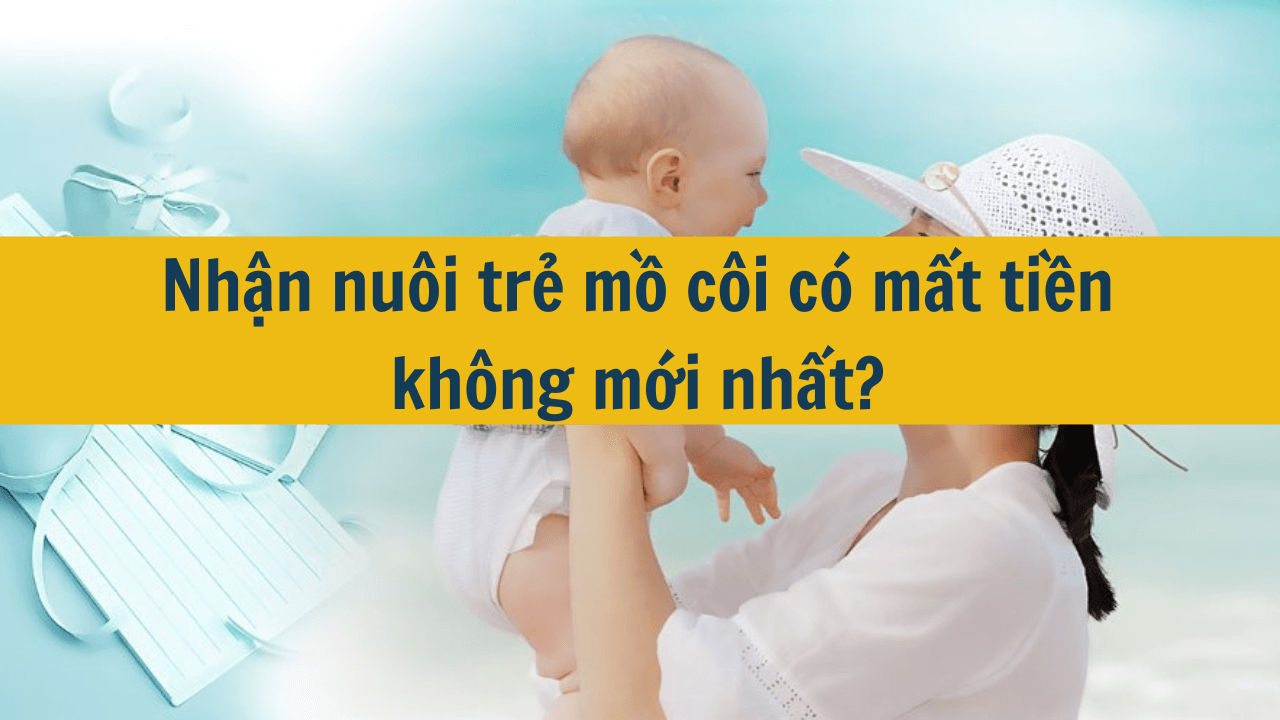
Nhận nuôi trẻ mồ côi có mất tiền không mới nhất 2025?
Việc nhận nuôi trẻ mồ côi là một hành động nhân văn, mang lại cơ hội cho trẻ em không nơi nương tựa được sống trong môi trường gia đình yêu thương và chăm sóc. Tuy nhiên, nhiều người vẫn thắc mắc về các chi phí liên quan đến thủ tục nhận nuôi, liệu có phải trả tiền khi nhận nuôi một trẻ em mồ côi hay không. Theo quy định mới nhất năm 2025, việc nhận nuôi trẻ mồ côi không yêu cầu phải trả một khoản tiền nào cho quá trình này, nhưng vẫn có những chi phí phát sinh trong quá trình làm thủ tục pháp lý. Bài viết dưới đây sẽ cung cấp thông tin chi tiết về các khoản chi phí và các quy định liên quan đến việc nhận nuôi trẻ mồ côi trong năm 2025. 28/12/2024Thời hạn giải quyết hồ sơ nhận nuôi con nuôi ở trại trẻ mô côi bao nhiêu lâu mới nhất 2025?
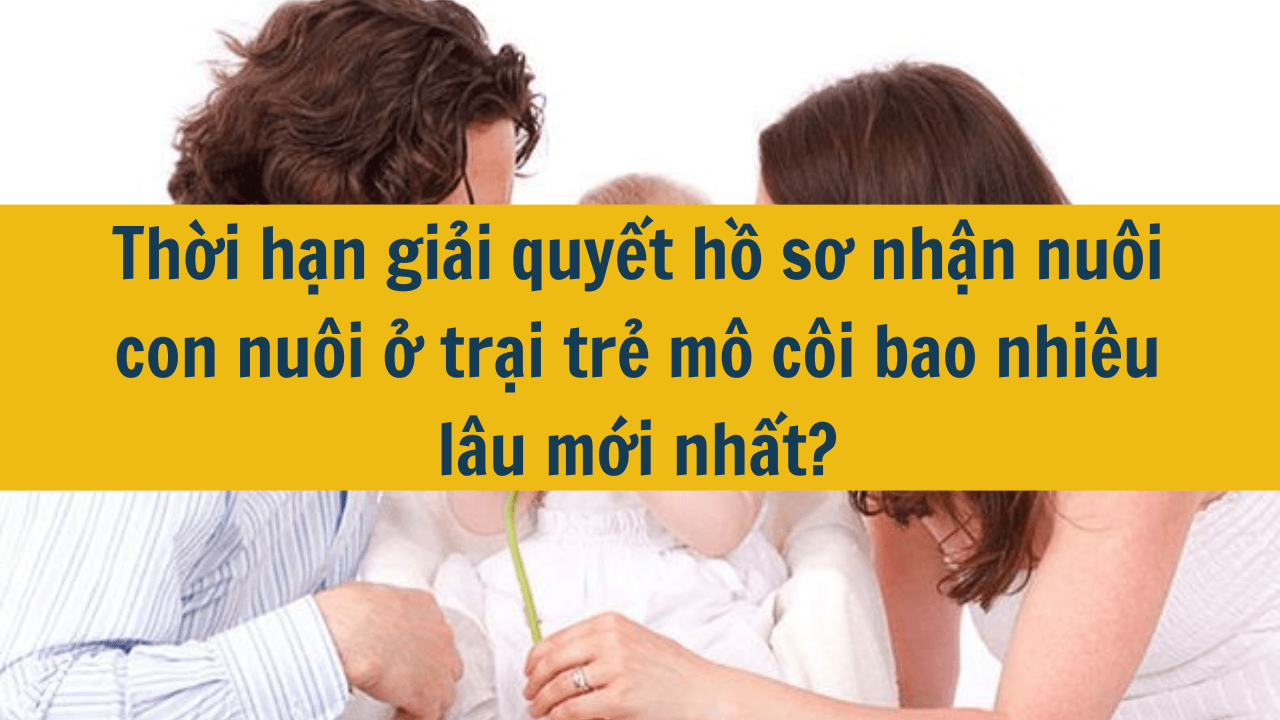
Thời hạn giải quyết hồ sơ nhận nuôi con nuôi ở trại trẻ mô côi bao nhiêu lâu mới nhất 2025?
Việc nhận nuôi con nuôi tại các trại trẻ mồ côi là một quy trình phức tạp, yêu cầu thời gian để đảm bảo rằng mọi bước đều được thực hiện đúng pháp luật và bảo vệ quyền lợi của trẻ em. Một trong những vấn đề quan trọng mà các cá nhân, gia đình quan tâm khi thực hiện thủ tục nhận nuôi là thời gian giải quyết hồ sơ. Theo các quy định pháp lý mới nhất trong năm 2025, thời gian giải quyết hồ sơ nhận nuôi con nuôi ở các trại trẻ mồ côi có thể thay đổi tùy theo từng trường hợp cụ thể. Bài viết này sẽ cung cấp thông tin chi tiết về thời gian giải quyết hồ sơ nhận nuôi con nuôi và các yếu tố ảnh hưởng đến quá trình này. 27/12/2024Điều kiện nhận nuôi con nuôi ở trại trẻ mồ côi được quy định thế nào mới nhất 2025?
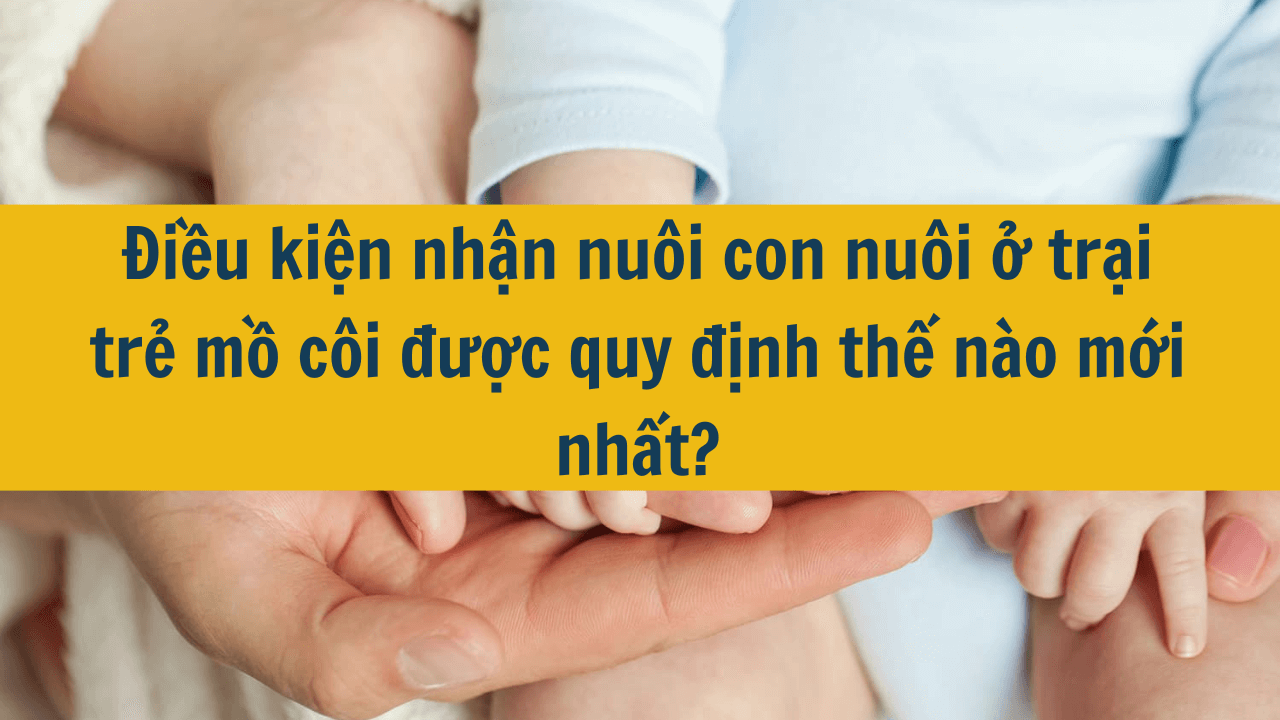
Điều kiện nhận nuôi con nuôi ở trại trẻ mồ côi được quy định thế nào mới nhất 2025?
Nhận nuôi con nuôi tại các trại trẻ mồ côi không chỉ là một hành động mang tính nhân văn, mà còn là một quy trình pháp lý nghiêm ngặt nhằm bảo vệ quyền lợi của trẻ em và gia đình nhận nuôi. Để có thể thực hiện việc nhận nuôi một trẻ em tại các cơ sở nuôi dưỡng này, các cá nhân hoặc gia đình cần đáp ứng một số điều kiện pháp lý cụ thể theo quy định của pháp luật Việt Nam. Những điều kiện này được thiết kế nhằm đảm bảo rằng việc nhận nuôi sẽ mang lại một môi trường sống ổn định và phát triển cho trẻ em. Bài viết này sẽ cung cấp thông tin chi tiết về các điều kiện nhận nuôi con nuôi ở trại trẻ mồ côi mới nhất năm 2025, giúp các bậc phụ huynh và cá nhân quan tâm hiểu rõ quy trình và các yêu cầu cần thiết. 27/12/2024Thủ tục nhận nuôi con nuôi ở trại trẻ mồ côi được thực hiện thế nào mới nhất 2025?

Thủ tục nhận nuôi con nuôi ở trại trẻ mồ côi được thực hiện thế nào mới nhất 2025?
Việc nhận nuôi con nuôi tại các trại trẻ mồ côi là một trong những phương thức giúp trẻ em có hoàn cảnh khó khăn được bảo vệ và phát triển trong một gia đình mới. Tuy nhiên, thủ tục nhận nuôi con nuôi tại các trại trẻ mồ côi không phải là một quy trình đơn giản, mà cần tuân theo các quy định pháp lý nghiêm ngặt để bảo đảm quyền lợi của trẻ em và gia đình nhận nuôi. Trong năm 2025, pháp luật Việt Nam tiếp tục điều chỉnh và hoàn thiện các quy trình này để đảm bảo tính hợp pháp, minh bạch và nhân đạo. Bài viết này sẽ giải thích chi tiết về các bước thủ tục nhận nuôi con nuôi tại trại trẻ mồ côi, cũng như những điều kiện mà các cá nhân, gia đình cần đáp ứng để có thể thực hiện việc nhận nuôi một cách hợp pháp. 27/12/2024Thủ tục nhận nuôi con nuôi trong nước mới nhất 2025

Thủ tục nhận nuôi con nuôi trong nước mới nhất 2025
Nhận con nuôi là một quyết định đầy ý nghĩa, giúp trẻ em có cơ hội được sống trong một gia đình đầy đủ yêu thương và chăm sóc. Tuy nhiên, để thực hiện thủ tục nhận nuôi con nuôi theo đúng quy định pháp luật, các bậc phụ huynh cần phải tuân thủ những quy trình và yêu cầu nghiêm ngặt. Bài viết này sẽ cung cấp thông tin chi tiết về thủ tục nhận nuôi con nuôi trong nước mới nhất 2025, từ việc chuẩn bị hồ sơ, điều kiện nhận nuôi, cho đến các bước pháp lý cần thực hiện. Những thông tin này sẽ giúp các gia đình hiểu rõ hơn về quyền lợi, nghĩa vụ và các bước cần thiết để hoàn tất thủ tục nhận nuôi con nuôi, đảm bảo quá trình diễn ra suôn sẻ và hợp pháp. 19/01/2025Trường hợp nào mẹ không được nuôi con theo quy định mới nhất 2025?

Trường hợp nào mẹ không được nuôi con theo quy định mới nhất 2025?
Quyền nuôi con sau khi ly hôn hay khi có tranh chấp về quyền nuôi dưỡng giữa cha mẹ là một vấn đề pháp lý quan trọng và đầy nhạy cảm. Theo quy định mới nhất của pháp luật năm 2025, không phải trong trường hợp nào người mẹ cũng được quyền nuôi con. Bài viết này sẽ phân tích các trường hợp mà mẹ không được nuôi con theo quy định mới nhất, từ những yếu tố ảnh hưởng đến quyền lợi của đứa trẻ cho đến những tiêu chuẩn mà pháp luật đưa ra. 19/01/2025Nộp hồ sơ nhận con nuôi trong nước ở đâu mới nhất 2025?
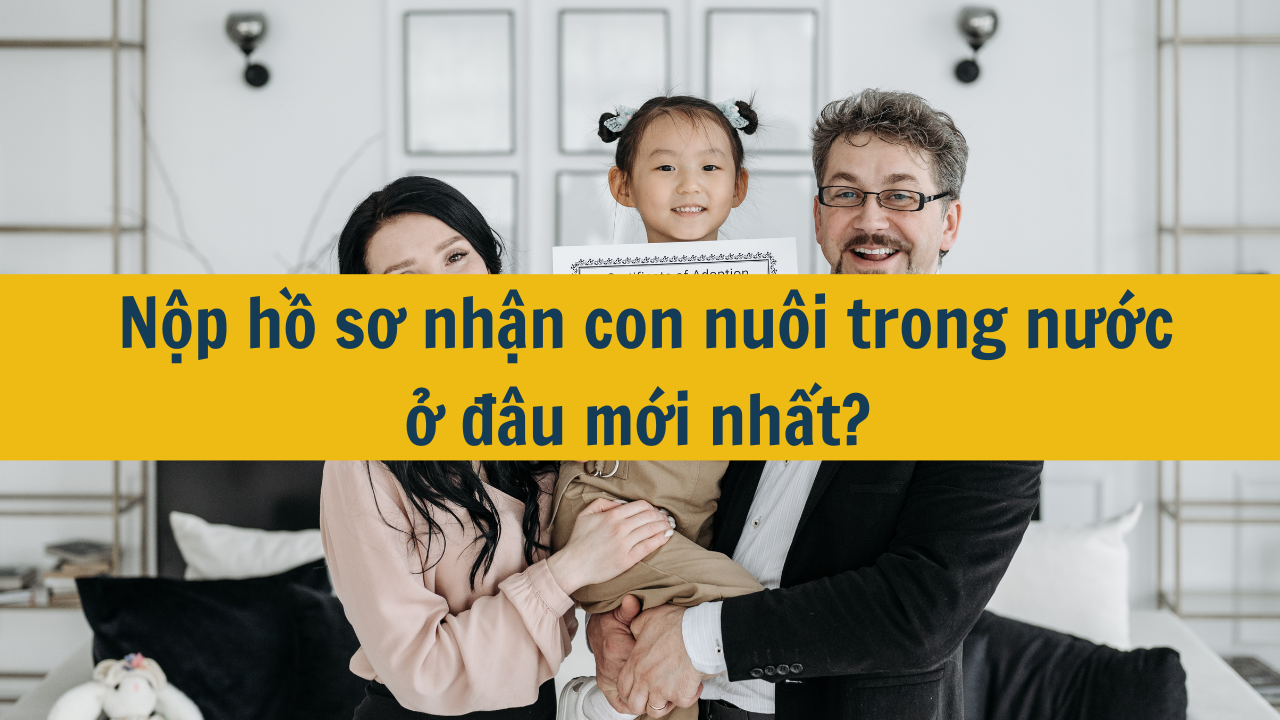
Nộp hồ sơ nhận con nuôi trong nước ở đâu mới nhất 2025?
iệc nhận con nuôi không chỉ là một quyết định quan trọng về mặt tình cảm, mà còn là một quá trình pháp lý cần tuân thủ nghiêm ngặt. Một trong những bước đầu tiên và quan trọng trong thủ tục nhận con nuôi là việc nộp hồ sơ đúng nơi quy định. Vậy nộp hồ sơ nhận con nuôi trong nước ở đâu? Đây là câu hỏi mà nhiều bậc phụ huynh có ý định nhận nuôi thường xuyên thắc mắc. 19/01/2025Nhận con nuôi từ bao nhiêu tuổi mới nhất 2025?

Nhận con nuôi từ bao nhiêu tuổi mới nhất 2025?
Nhận con nuôi là một quá trình mang tính nhân đạo cao, đồng thời yêu cầu tuân thủ nghiêm ngặt các quy định pháp luật nhằm bảo vệ quyền lợi của cả người nhận nuôi và trẻ được nhận nuôi. Theo các quy định mới nhất cập nhật năm 2025, độ tuổi tối thiểu để trẻ em được nhận làm con nuôi cũng như người nhận nuôi phải tuân theo các điều kiện cụ thể nhằm đảm bảo phù hợp với nhu cầu chăm sóc, nuôi dưỡng và phát triển. Bài viết dưới đây sẽ làm rõ độ tuổi cần thiết để nhận con nuôi, cùng các yếu tố pháp lý liên quan, giúp bạn hiểu rõ hơn về quy trình này. 27/12/2024Mẫu đơn xin nhận con nuôi trong nước mới nhất 2025
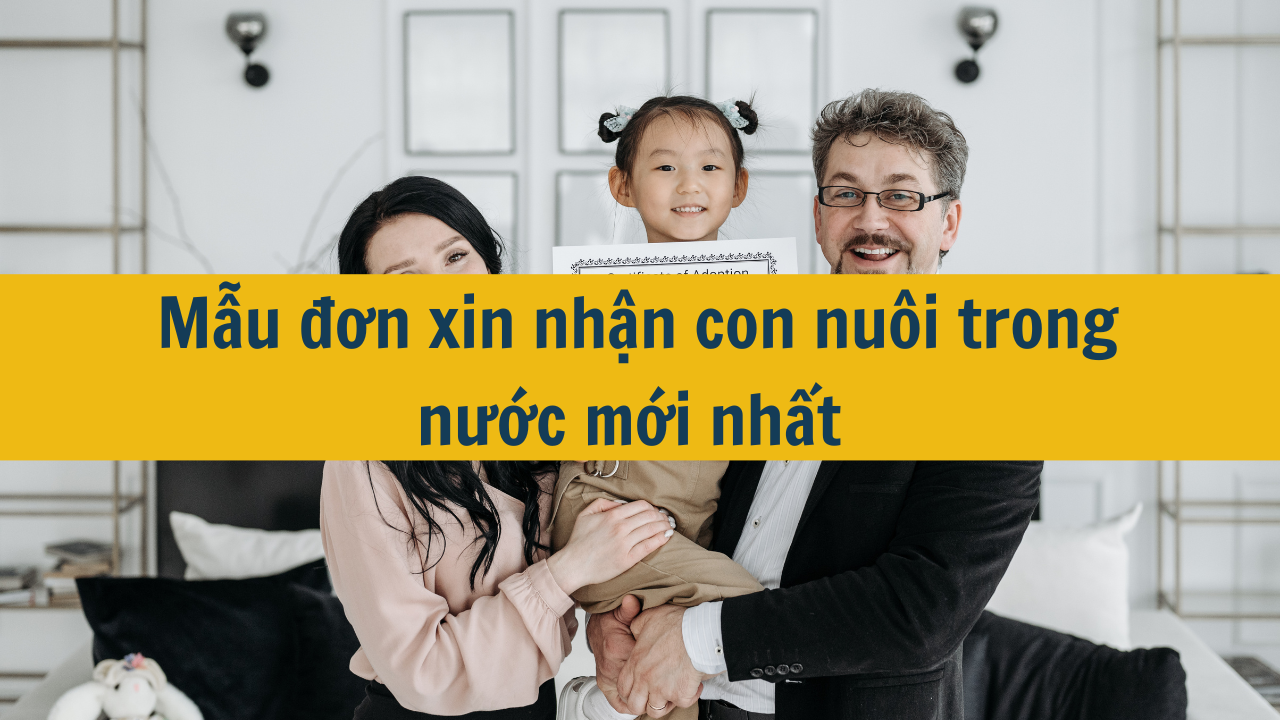
Mẫu đơn xin nhận con nuôi trong nước mới nhất 2025
Việc nhận con nuôi là một hành động đầy nhân văn, thể hiện sự quan tâm và yêu thương đối với những trẻ em thiếu thốn tình cảm gia đình. Để thực hiện thủ tục này tại Việt Nam, các cá nhân, gia đình cần tuân thủ đúng các quy định pháp lý, trong đó mẫu đơn xin nhận con nuôi đóng vai trò quan trọng. Bài viết này sẽ giới thiệu chi tiết về mẫu đơn xin nhận con nuôi trong nước mới nhất 2025, cùng các bước hướng dẫn điền đơn và các lưu ý cần thiết để quá trình nhận con nuôi diễn ra suôn sẻ. Những thông tin trong bài sẽ giúp các bậc phụ huynh hiểu rõ hơn về các thủ tục, cũng như những yêu cầu cần thiết trong việc xin nhận con nuôi theo quy định hiện hành. 19/01/2025Độc thân có được nhận con nuôi không mới nhất 2025?


 Luật nuôi con nuôi 2010 (Bản Word)
Luật nuôi con nuôi 2010 (Bản Word)
 Luật nuôi con nuôi 2010 (Bản Pdf)
Luật nuôi con nuôi 2010 (Bản Pdf)